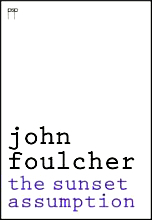
The Sunset Assumption Pitt Street Poetry, 2012
Adapted from the launch speech on 19 July, 2012 at Collected Works Bookshop, Melbourne.
At Pitt Street Poetry, a new poetry imprint in Sydney, the venture begins with the production of John Foulcher’s ninth book of poetry, The Sunset Assumption. I fell in love during the reading of this book – so strong were my feelings. But ‘in love with what?’, I kept querying. Not the expressions of love itself: human love is an assumed thing in this book.
Earlier work by Foulcher has canvassed the children, the marriage. Here, in Paris, there are only ‘fragments from home’: a smooth comfort of long-term loving, the shared memories that cannot be come by in any other way. In a foreign city, the poet dreams ‘about houses that sprout familiar walls’, where the light is ‘wild moonlight’.
This book is rather about spiritual living and history; about light and dark but not always in an oppositional way. It concerns our beliefs about religion and about art, and also about the rightness and wrongness in historical moment and politics.
The poems are mature and reflective, emerging out of Paris, yet not confined by the place or its history. ‘City of Light’, the place also has its shadows, and the book explores both as it flows back and forth between concrete solidity and the ethereal, intangibles.
The form of poetry ranges from prose poems to couplets, with short-ended lines and mostly short poems. There is an astonishing newness of image, a stunning gift of presenting the old as alive, as in ‘Snow’:
Snow One morning there’s snow, peeling from the great frescoes of sunrise. Big flakes, as intricate as feathers. It’s like the end of the world. Going outside, you raise your eyes to the snow, and it feels as if some kind of insect were crawling all over your face. Small steps of cold, the warmth in your blood. The snow has an air of providence. It forgives the streets for the thing they’ve become, it lets the future get on with itself. It allows the trees a dark underside and it makes no judgment about cobblestones or bitumen. When you walk across it, your footsteps sound like the crunching of bones.
Foulcher’s early work was starkly imagist: ‘no ideas but in things’ as William Carlos Williams put it. It moved then towards the ‘learning curve’ of narrative, before entering a more surrealist form. In this book, the flowering of all those developments becomes a brilliant companionship of clarity, opaque possibility and imagist beauty as we are drawn along the trajectory of an unveiling of a spiritual belief both diffuse and full of an absent presence.
This book is playing with light in many forms, a preoccupation of Foulcher’s. Perhaps because it light is as ethereal as soul. Perhaps because it carries its companion, the dark. Possibly because it is a useful shape-shifter for a poet.
The first poem in this book introduces light as character witness, the active element at play, and it flows with a kind of tenderness:
Visit Light slips in past the curtain, shuffling like a guest, though it knows this room. You get on with things, while the light makes itself at home. It gives back to the room those colours you left in another place. You try to convince it to stay, but the afternoon comes calling for it, hurries it on into the long evening that drifts in and out of the air. It leaves you the lamps in the street. Small moons, loose change. The glow from an open door.
In ‘The Suit’, his mother, during his dream, inhabits a house not hers in reality but one that is ‘sprinkled with light like icing sugar’.
Later in the book, light spills from the paintings Foulcher uses to enter into the French Revolution, with its extremes and madness. Regarding Monet’s painting Camille Monet sur son lit de mort, 1879:
you wonder about that light, that tipped bowl of light that’s spilled everywhere. Where does it come from, that light he pours over coastlines, over the haystacks and the shimmering lilies, that’s trickled across her bed, her face as still as a lily, the ripples of her white nightdress?









